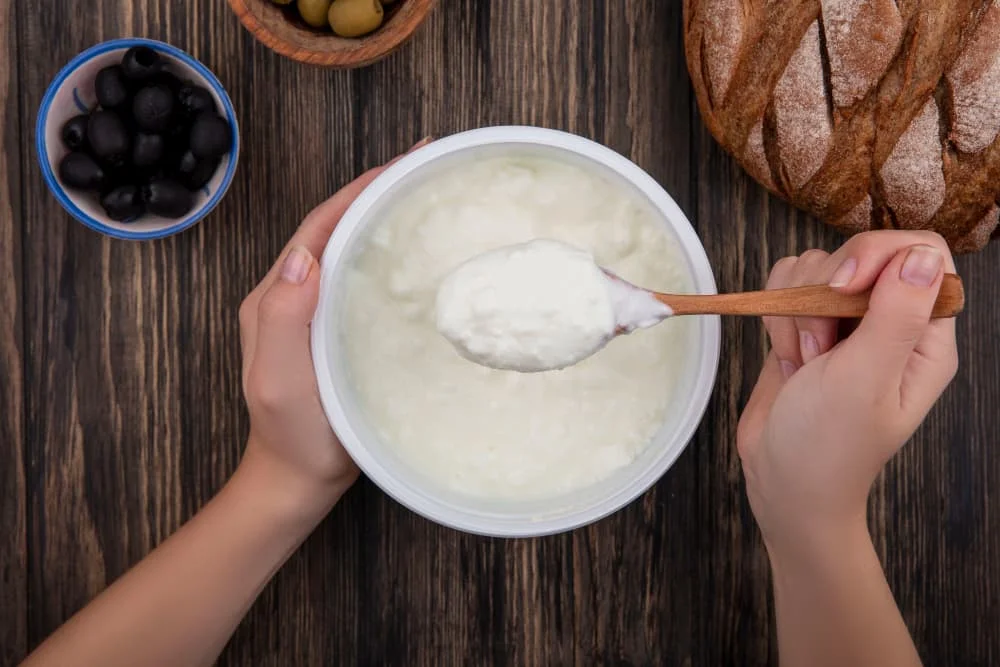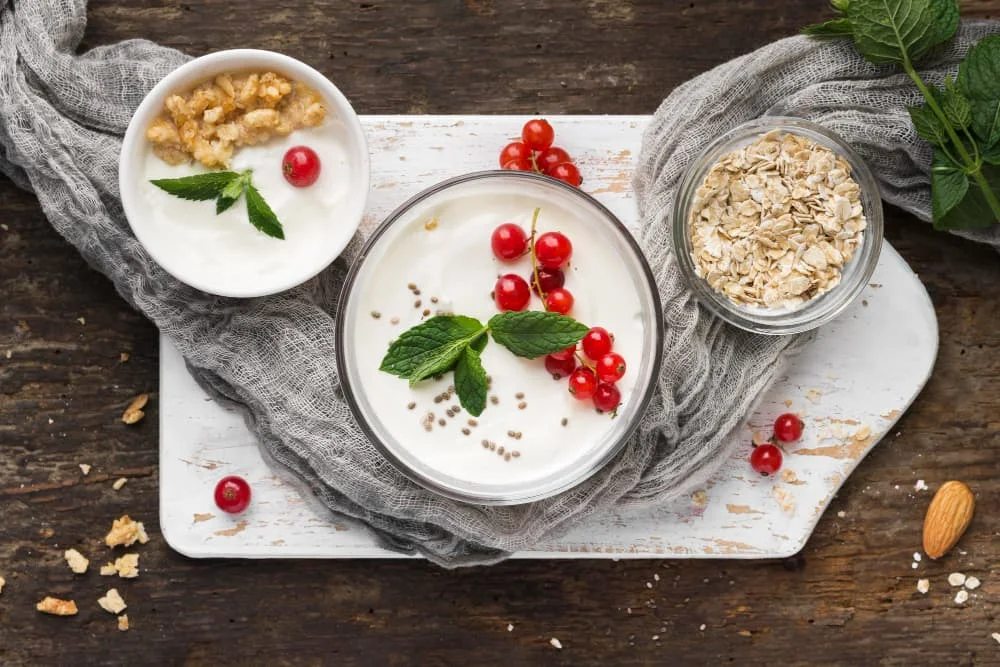In recent years, Greek yogurt has become a go-to choice for health-conscious individuals, and it’s easy to see why. Known for its rich, creamy texture and tangy flavor, this yogurt is much more than a tasty snack or breakfast option. It’s a nutrient-dense food that can deliver a wide range of health benefits.
This article will take an in-depth look at the Greek yogurt nutrition profile, highlighting its unique features and comparing it to regular yogurt. We’ll also explore the scientifically supported benefits that make this dairy product a standout in the realm of healthy eating.
By the end, you’ll see why yogurt is considered a staple in many diets, whether you’re focused on weight loss, boosting protein intake or simply maintaining a balanced diet. Let’s uncover what makes this superfood so special.
What is Greek Yogurt?
Greek yogurt is a strained yogurt known for its thick, creamy texture and rich protein content. This straining process removes much of the liquid whey, resulting in a yogurt that’s denser and tangier than traditional varieties. Because of this, its become a favorite among those looking for a nutrient-packed, high-protein food.

How is Yogurt Made?
The production process involves culturing milk with live and active cultures, followed by straining the mixture multiple times to remove whey and lactose. This gives yogurt its signature consistency while also reducing sugar and carbohydrate content compared to regular yogurt. The result is a product that’s not only creamier but also more concentrated in nutrients.
Types
Greek yogurt comes in several varieties, catering to different dietary needs:
- Full fat: Made with whole milk, providing a rich flavor and the highest fat content.
- Low-fat: Created with reduced-fat milk, offering a balance between creaminess and lower fat levels.
- Non-fat (Fat-free): Made with skim milk, offering all the benefits of yogurt with minimal fat.
- Flavored: Includes added sweeteners or natural flavors; always check labels for sugar content.
For those who need a Greek yogurt alternative, dairy-free versions are widely available. These are often made from soy, almond or coconut milk and aim to replicate the texture and taste of traditional yogurt while accommodating plant-based or lactose-free diets.
Greek Yogurt Nutrition: A Closer Look at the Facts

Greek yogurt is celebrated not only for its creamy texture and tangy flavor but also for its impressive nutritional profile. Here’s why it stands out as a go-to option for healthy eating.
| Nutrient | Non-Fat Greek Yogurt (100g) | Low-Fat (100g) | Full-Fat (100g) |
| Calories | 59 | 73 | 97 |
| Protein | 10g | 10g | 9g |
| Fat | 0.4g | 2g | 5g |
| Carbohydrates | 3.6g | 4g | 4g |
| Sugar | 3.2g | 4g | 4g |
| Calcium | 110mg | 100mg | 100mg |
| Potassium | 141mg | 140mg | 140mg |
| Sodium | 36mg | 40mg | 40mg |
Greek Yogurt Nutrition Facts
Yogurt offers a rich supply of protein, vitamins, and minerals while being lower in sugar and carbohydrates than regular yogurt. Below is an overview of its nutritional content per 100g serving (plain, non-fat):
- Calories: Approximately 59
- Protein: Around 10g
- Fat: 0.3g
- Carbohydrates: 3.6g
- Sugar: 3.2g
The actual values may vary slightly depending on the brand and type of yogurt.
Key Vitamins and Minerals
Greek yogurt is a rich source of several essential nutrients:
- Vitamin B12: Supports red blood cell formation and brain function.
- Riboflavin (B2): Aids in energy metabolism and cellular health.
- Phosphorus: Contributes to strong bones and teeth.
- Calcium: Vital for bone strength and muscle function.
- Selenium: Acts as an antioxidant and boosts immune health.
How many calories are in 1 cup of plain Greek yogurt?
A standard 1-cup serving of plain, non-fat Greek yogurt (245g) contains about 145 calories. Low-fat and full-fat options will have a higher calorie count due to their fat content. Always check the label for exact numbers.
How many calories are in a bowl of yogurt?
The calorie content of a bowl of yogurt depends on several factors, including the bowl’s size and the yogurt type. A typical serving range between 150 and 250 calories, but toppings like honey, granola or fruit can add significantly more.
Is Greek yogurt high in calories?
Plain, non-fat yogurt is relatively low in calories, making it an excellent choice for those looking to maintain or lose weight. However, full-fat or flavored varieties can have higher calorie counts due to added fats and sugars. Your choice of yogurt should align with your dietary goals.

The 4 Health Benefits of Greek Yogurt: More Than Just a Creamy Treat
Greek yogurt is more than just a delicious snack—it’s a nutrient-packed powerhouse with a range of health benefits. Here’s why adding it to your diet could be a game-changer:
1. A Powerhouse of Protein
One of the standout features of Greek yogurt is its high-quality protein content, making it particularly appealing to athletes and fitness enthusiasts. Protein is essential for repairing and building tissues, especially muscles. Including it in your diet post-workout can help replenish muscles with amino acids, promoting recovery and growth. Its protein content also makes it a satisfying choice for breakfast or a mid-day snack.
2. Supporting a Healthy Gut and Digestion
Yogurt is often rich in probiotics, live bacteria that support a healthy gut microbiome. These beneficial microbes can:
- Aid digestion and improve nutrient absorption.
- Support immune health by maintaining a balanced gut environment.
- Reduce symptoms of bloating or discomfort caused by poor digestion.
3. Building Strong Bones with Calcium and More
This yogurt is also an excellent source of calcium, a crucial mineral for maintaining strong and healthy bones. Many varieties are fortified with Vitamin D, enhancing your body’s ability to absorb calcium. Additionally, it contains phosphorus, further supporting bone density and reducing the risk of osteoporosis.
4. Weight Loss and Satiety
Is Greek yogurt good for weight loss? Absolutely. Its high protein content helps you feel fuller for longer, reducing the urge to snack between meals. Opting for non-fat or low-fat options can provide all the benefits while keeping calorie intake in check.
Additional Benefits
Some studies suggest that yogurt may also:
- Help regulate blood pressure, thanks to its potassium content.
- Improve mood and mental clarity through its impact on gut health.
Important Tip: For maximum benefits, choose plain, unsweetened varieties to avoid added sugars. Add your own fresh fruit or nuts for a balanced, flavorful meal.
Are There Vegan Alternatives to Greek Yogurt?
For those who prefer plant-based diets or need to avoid dairy, vegan alternatives to Greek yogurt offer a fantastic solution. These options replicate the creamy texture and tangy taste of yogurt, using plant-based ingredients.

Greek Yogurt Vegan Options
Traditional yogurt is dairy-based, but many brands now provide vegan versions crafted from plant-derived sources such as:
- Soy Milk: Soy-based yogurts are a leading choice due to their comparable protein levels and smooth texture.
- Coconut Milk: Known for its rich and creamy consistency, coconut milk yogurt is ideal for those who enjoy a more indulgent option, although it tends to be higher in fat.
- Almond Milk: Almond-based yogurts offer a lighter texture and a mild, nutty flavor.
- Cashew Milk: Cashew-based yogurts provide a velvety texture that closely resembles the creaminess of dairy yogurts.
Choosing an Alternative
When selecting a plant-based Greek yogurt alternative, consider the following:
- Nutritional Content: Many plant-based options are fortified with calcium, vitamin D, and B12 to align with the nutritional benefits of traditional yogurt.
- Protein Levels: Protein content can vary widely among vegan options. Soy-based varieties typically offer the highest protein levels.
- Added Sugars: Opt for unsweetened versions to minimize added sugar intake while retaining a natural flavor.
- Texture and Consistency: Some “Greek-style” vegan yogurts are strained or cultured to achieve a thicker consistency like that of traditional yogurt.
These alternatives ensure that those avoiding dairy can still enjoy the versatility and health benefits associated with yogurt. With so many options available, it’s easy to find a plant-based yogurt that suits your dietary needs and taste preferences.
Ways to Enjoy Yogurt
Greek yogurt is not only nutritious but also incredibly versatile. Its rich texture and tangy flavor make it an excellent addition to a variety of meals and snacks. Here are some creative ways to incorporate it into your diet:
Breakfast Options
- Parfaits: Layer it with fresh berries, granola, and a drizzle of honey for a balanced and satisfying start to your day.
- Oatmeal Boost: Stir it into your oatmeal for added creaminess and a boost of protein.
- Pancake Topping: Use it as a topping for pancakes or waffles instead of whipped cream or syrup.
Smoothies
Blend yogurt into smoothies to create a thicker texture and enhance the protein content. Combine it with fruit, spinach, or nut butter for a nutrient-packed beverage.
Sauces and Dips
- Healthier Substitutes: Replace sour cream or mayonnaise with Greek yogurt in dips, dressings, and sauces.
- Tzatziki: Use it as the base for this classic Mediterranean dip by adding cucumber, garlic, and dill.
- Creamy Dressings: Whip up a healthier ranch or Caesar dressing using yogurt.
Dessert Ideas
- Frozen Treats: Freeze it into popsicles with fresh fruit for a refreshing dessert.
- Healthy Frosting: Use it as a substitute for frosting on cakes or cupcakes by mixing it with a touch of honey or vanilla.
- Fruit Pairings: Pair it with sliced bananas, apples, or strawberries for a guilt-free treat.
Savory Applications
- Soup Enhancer: Add a dollop to soups, stews, or chili for added creaminess and a tangy kick.
- Marinades: Use it as a tenderizing marinade for chicken, lamb, or beef by mixing it with herbs and spices.
- Binding Agent: Incorporate it into recipes like meatballs or veggie burgers for added moisture and flavor.
Creative Snacks
- Avocado Pairing: Mix it with avocado and lime for a creamy dip or spread.
- Spicy Dip: Blend it with hot sauce and seasonings to create a spicy dip for veggies or chips.
Experiment with these ideas to make yogurt a staple in your meals. Whether you’re crafting a savory dish or a sweet indulgence, this versatile ingredient adds a boost in nutrition and flavor to any recipe.
Conclusion
Greek yogurt stands out as a versatile and nutrient-dense food that can elevate your health and meals. From its rich protein content to its gut-friendly probiotics and essential vitamins and minerals, it offers a wide range of benefits for those seeking a healthier lifestyle. Whether you’re looking to enhance your diet with a protein-packed snack, support your digestive health, or explore creative ways to elevate your dishes, yogurt is a fantastic choice.
Frequently Asked Questions (FAQs)
Can I eat yogurt every day?
Yes, Greek yogurt can be enjoyed daily as part of a balanced diet. It provides essential nutrients, but it’s important to choose plain, unsweetened options to avoid added sugars. Keep portion sizes in mind, especially if you’re managing your calorie intake.
How much yogurt should I eat per day?
A typical serving is about 1 cup (200-250 grams) per day. The exact amount can vary depending on your dietary needs, activity level, and overall health goals.
Is yogurt suitable for lactose-intolerant individuals?
Yogurt contains less lactose than regular yogurt due to its straining process, making it easier to digest for some people with lactose intolerance. However, individual tolerance levels vary, and those with severe intolerance may prefer lactose-free alternatives.
Can I use yogurt as a substitute for sour cream or mayonnaise?
Yes, yogurt works as a healthier alternative to sour cream or mayonnaise. Its creamy texture and tangy flavor make it an excellent choice for dips, dressings, and sauces.
What is the best way to store yogurt?
Store yogurt in the refrigerator and consume it by the “best by” date. Once it’s opened, it’s best to finish it within a week. Ensure the container is sealed tightly to maintain freshness.
Can I freeze yogurt?
Yes, freezing yogurt is an option, though the texture may change upon thawing, becoming slightly grainy or watery. While it’s still safe to eat, frozen yogurt is best used in smoothies or cooked recipes rather than eaten plain.






